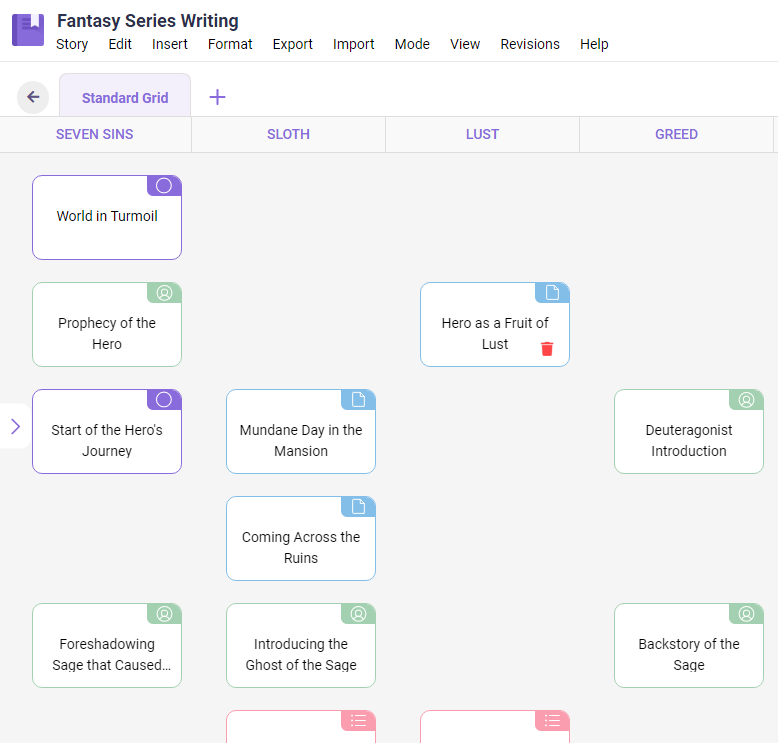Fantasy Series Writing with LivingWriter

Gone are the days when fantasy novels were niche and only really appealed to specific cult followings, as fantasy series now take on mainstream media, with Game of Thrones, Harry Potter, Maze Runner, and many other titles gaining household fame. There’s no better time to write a fantasy series than today!

Fantasy series writing, however, is a great beast to tame, and you will need all the help that you can get to navigate across your universe, your worldbuilding, and the expansive cast of characters that you are going to introduce. Read on to know how to write a great fantasy epic, with extra tips on how LivingWriter can make it so much easier for you as a fantasy writer!
Fantasy Series Writing in General
Any genre is capable of being written and expanded into a series of novels, yet the fantasy genre almost requires its novels to be written as a series. The worldbuilding and the natural complexity that is attributed to fantasy novels cannot be contained in a single volume of 100k or so words.
Fantasy series writing is a long process, and it may even become your life’s purpose. However, the process can be made efficient, to satisfy both you as the author and the readers who look forward to meeting your world and your characters!
Tips on Writing a Great Fantasy Series
Identify your subgenre

The fantasy genre itself is a pretty broad field, with multiple subgenres such as steampunk, sci-fi, high fantasy, and so on. Each of these subgenres have unspoken expectations, tropes, and commonalities that their respective audiences look forward to. By understanding first and foremost your subgenre, you also understand what your target readers will expect out of your series.
This can greatly help you in the planning phase of the series, as you now have an idea on the concepts that you can play around. Knowing your subgenre also tells you about the tropes that your readers will expect, and you can plan your twists around the tropes of the genre to make your novels stand out in that subgenre.
Plot your entire story
Fantasy series can come in a trilogy, a set of six, or maybe even a ten-part epic. Although pantsers can still do well writing a fantasy series (look at George R.R. Martin’s A Song of Ice and Fire), but the general advice is to go for an architect-writer style and plot your story.

You can do this through one of two ways: the first is to determine the number of books you want the series to have, then fit your plot inside this book count, or plot your story beforehand then determine how to cut through your plot by book. No matter which method you use, this step ensures one thing: you know your story’s end, and you have an outline that will guide you at all phases of the writing process.
Fantasy series of epic proportions can easily go out of hand if you don’t prepare on how to get to the end of it. The grand narratives that fantasy stories tell are often expansive, and will inevitably include a myriad of interlinked subplots that can easily get tangled if not managed properly. Although subplot management might not be as important in this phase, you might want to plan them ahead to avoid unnecessary information bloat.

LivingWriter’s Plot Board is a heavensend for exactly these kinds of things. The Standard Grid allows you to have an overview of your overall plot and the plots of each novel, and how each plotline interacts with the others. The Standard Grid is also perfect for seeing the chronology of your plotlines, which can be important when your characters are separated, progressing separate subplots.
Explore your fictional world
One of the biggest selling points of a fantasy series is the inclusion of a fictional world that may or may not be very similar to our real one. Make great use of this fictional world by exploring it across the series, letting your main cast travel through the expanse of this massive universe.

Exploration entails vivid descriptions of the world. To fully immerse your reader, utilize sensory writing: writing that caters to all five human senses. Make sure to describe what your characters see, hear, feel, smell, and scrutinize the cuisine of the world. Extensively use metaphors that draw parallels to our real world, so that readers can relate and understand how it is to exist in that world.
Exploring your world also means understanding the rules that govern this universe and its magics and respecting these rules. You don’t have to drop this information bomb right away to the reader, too: there are far more creative ways to explain the mechanisms that make this world tick than just telling the reader how it works. Here, the tip “Show, don’t tell” shines so well.

You also need to respect the rules that you have set up for your world. This makes your world as realistic as possible, despite being fictional. Set limitations, and if your character manages to break through it, better prepare a good explanation for it. Your characters should not be able to deus ex machina their way through sheer plot armor and protagonist privileges.

If you want to have notes about your fictional world and its systems, LivingWriter got you covered. Story Elements allows you to create a Story Element, which can be anything from a character to a setting to a specific mechanic in your world, and you can write exhaustive details about this element to your heart’s content. The best part about this is that you can easily pull all your notes about this specific element while writing your manuscript, reminding you of the rules that will make your story realistic.
Avoid information dump
With a new world and a new cast of characters, it’s very easy to fall into the trap of information-dumping new content in each novel at the starting chapter. As authors, we can be very excited on telling our readers the *cool, new things* that we came up with. However, you, as a fantasy reader, should also know that this is not good writing.
It’s cool and all to have new things in every novel, it’s in fact a great way to retain interest in the world and the novel. However, you should avoid dumping it all at your reader, almost making your first chapter akin to your story notes. A good way to manage this is to naturally introduce information as soon as it becomes relevant, either for the plot or for foreshadowing.

This is applicable for characters, too. The exploratory nature of fantasy epics will let your main cast meet new secondary characters on the way, yet you don’t have to introduce them at the start, especially if we will only meet them later on, or maybe never, which can be common for seemingly major entities such as the Great Wizard or the Orc Chieftain or any equivalent in your fantasy world.
Fantasy novels are stories, not textbooks which introduce the annoying chore of memorizing terms and characters for the readers.
Make your own brand of the fantasy tropes
Going off from point 1, after understanding the tropes of your genre, you should also introduce your own little quirks that will separate your world from other fantasy worlds. This applies to all tropes, from world systems and fantasy races to narrative plots.
Of course, you can just easily ride on the coattails of these tropes and instead build on it for your story. The tropes of the fantasy genre are solid bases for any fantasy story, and it is where many fantasy novels have earned their popularity. With a well-written character and character arc, as well as great plot development, you can have a polished fantasy series that is sure to satisfy your readers.
Write Your Fantasy Series with LivingWriter
Fantasy series writing is a challenge far greater than that of writing a single volume, yet there is so much potential in this genre. With the genre getting mainstream attention, you would be hard-pressed to look for a genre with a healthier readership. Of course, to ease the challenges set upon writing a fantasy series, you can always trust LivingWriter and its vast array of helpful and powerful features.
Try LivingWriter now!